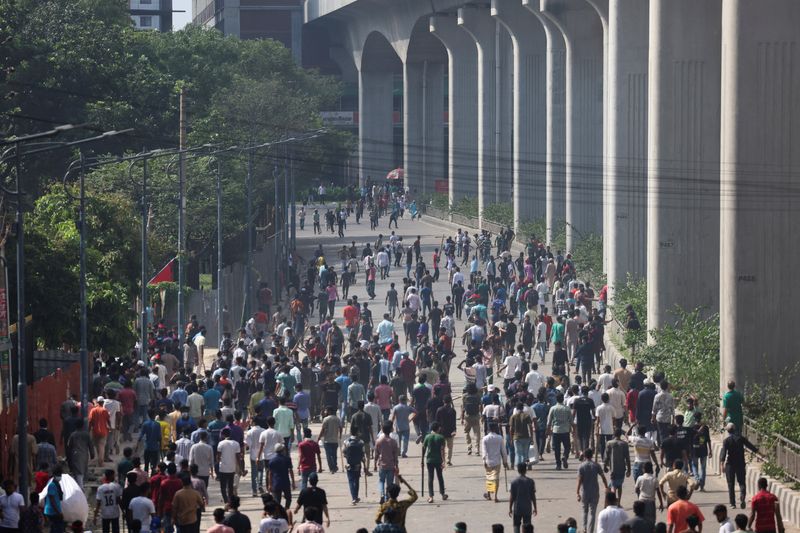Bangladesh protesters call for march to Dhaka in defiance of curfew
2024.08.05 00:00
By Ruma Paul
DHAKA (Reuters) – Protesting students in Bangladesh have called for a march to the capital Dhaka on Monday in defiance of a nationwide curfew to press Prime Minister Sheikh Hasina to resign, a day after deadly clashes in the South Asian country killed nearly 100 people.
Bangladesh has been engulfed by protests and violence that began last month after student groups demanded scrapping of a controversial quota system in government jobs. That escalated into a campaign to seek the ouster of Hasina, who won a fourth straight term in January in an election boycotted by the opposition.
At least 91 people were killed and hundreds injured on Sunday in a wave of violence across the country of 170 million people as police fired tear gas and rubber bullets to disperse tens of thousands of protesters. Starting Sunday evening, a nationwide curfew has been imposed, the railways have suspended services and the country’s huge garments industry has closed.
Sunday’s death toll, which included at least 13 policemen, was the highest for a single day from any protests in Bangladesh’s recent history, surpassing the 67 deaths reported on July 19 when students took to the streets against the quotas.
The government declared the indefinite nationwide curfew starting at 6 p.m. (1200 GMT) on Sunday and also announced a three-day general holiday starting from Monday.
“The government has killed many students. The time has come for the final answer,” protest coordinator Asif Mahmud said in a statement on Facebook (NASDAQ:) late on Sunday. “Everyone will come to Dhaka especially from the surrounding districts. Come to Dhaka and take a position on the streets.”
The Bangladesh army urged everyone to obey the curfew rules.
“The Bangladesh army will perform its promised duty in line with the Bangladesh constitution and existing laws of the country,” it said in a statement late on Sunday.
“In this regard the people are requested to abide by the curfew as well as give full cooperation to this end,” it said, adding that the curfew was imposed to ensure the security of people’s lives, properties and important state establishments.
Over the weekend, there have been attacks, vandalism and arson targeting government buildings, offices of the ruling Awami League party, police stations and houses of public representatives, local media reported. Violence was reported in 39 of the country’s 64 districts.
ARMY ROLE IN FOCUS
Bangladesh Railway said it had suspended all services indefinitely due to the escalating violence.
Garment factories in the country, which supply apparel to some of the top brands in the world, have also been closed indefinitely.
“In view of the prevailing situation, owners have decided to close all garment factories across the country, considering the overall safety of the workers,” the Bangladesh Garment Manufacturers and Exporters Association said.
The unrest, which has prompted the government to shut down internet services, is Hasina’s biggest test in her 20-year regime after she won a fourth straight term in elections that were boycotted by the main opposition Bangladesh Nationalist Party.
Critics of Hasina, along with human rights groups, have accused her government of using excessive force against protesters, a charge she and her ministers deny.
For the second time during the recent protests, the government has shut down high-speed internet services, mobile operators said. Social media platforms Facebook and WhatsApp were not available, even via broadband connections.
Last month, at least 150 people were killed and thousands injured in violence touched off by student groups protesting against quotas for government jobs.
The protests paused after the Supreme Court scrapped most quotas, but students returned to the streets in sporadic protests last week, demanding justice for the families of those killed and Hasina’s resignation.
Hasina has said that “those who are carrying out violence are not students but terrorists who are out to destabilise the nation”.

The role of the country’s army in tackling the violence has come into focus with a group of retired military officers urging Hasina to withdraw troops from the streets and undertake “political initiatives” to resolve the crisis.
Chief of Army Staff General Waker-Uz-Zaman has said the army will always be there for the people’s interests and for any needs of the state. He is due to brief the media on Monday.








